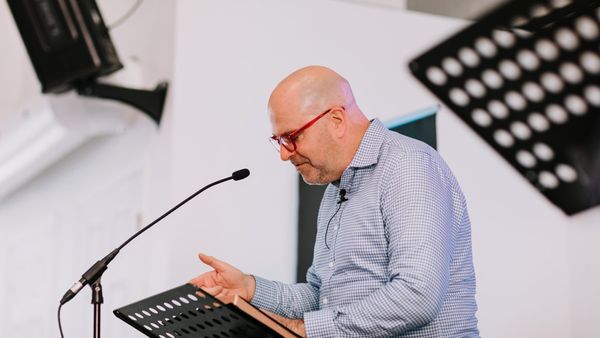So what is the gospel?
The gospel is set within a larger story of a good world that’s gone bad because of human sin. Unless we understand the larger story, it’s impossible to understand the gospel itself. The Bible tells one unified story that explains our world, and the centerpiece of that story is the gospel.
God created all things good, including us, but we rebelled against Him.
We see evidence of the brokenness of the world all around us: wars, violence, injustice, inequity, relational breakdown, natural disasters, sickness, death, and more. The world is broken beyond our ability to fix it. Not only is the world broken, but so are we. But God didn’t create the world like this. We’ve contaminated the world through our treason against a good and holy God.
We made such a mess of this world that God would have been justified in writing us off. He would be right to judge us and be done with us.
There's good news.
But instead, God chose to rescue us. God—one God who is three persons: Father, Son, and Holy Spirit—conspired together to save us. The Father sent His Son, Jesus, to become one of us. Instead of destroying the world, He entered it. When Jesus was born, He became the first person in history to live without rebelling against God. His obedience was perfect. Jesus also gave us a taste of life the way it should be. He healed the sick, served outcasts, and confronted injustice. The miracles He performed foreshadowed the day when God will restore the world to the way it should be.
But that’s not even the best part.
Although Jesus was the first truly innocent person to ever live, He took our place and died as payment for sins we committed. He repeatedly emphasized that this is why He came. He not only entered the world filled with people who deserved to be judged, but He took that judgment on Himself so we don’t have to. And by doing this, He restored us to a relationship with our heavenly Father.
To everyone’s surprise, Jesus’ followers found His grave empty three days after He’d been killed. Over five hundred people saw Him alive before He ascended to heaven. His resurrection proved that what He said was true. It vindicated Him. It also shows us that we can trust Him, and it gives a preview of what will happen to those who follow Him.
One day Jesus will return and judge all of us, and then He’ll completely renew our world. Those who have trusted Jesus will enjoy the world as it was meant to be, in perfect relationship with God and others.
But now, God calls for our response.
God invites us to come to Him in surrender, admitting our need. God calls us to admit the truth about ourselves, to turn away from our sins, and follow Him in faith and trust. There’s only one way out of the mess we find ourselves in, and that’s through Jesus. We’ve been found guilty, but Jesus has already paid the penalty for those who put their trust in Him. If we cling to our own efforts to pay that penalty, we’ll miss out on what Jesus has done and face the penalty ourselves — a penalty that’s more than we can ever pay. We must take advantage of the gospel. It’s our only hope.
Until Jesus comes back, the church’s role is to show and tell the story of the gospel. The gospel motivates us, guides us, and empowers us. It calls for a response. Once we respond with genuine repentance and faith, the gospel changes everything.
Whew. That’s a lot, yet it’s barely scratching the surface of what the gospel means.
The gospel can be summarized by understanding three truths:
- God is holy.
- Humanity is sinful.
- God is rescuing his people and creation through the perfect work of Jesus Christ.
These truths set everything right.
They not only show us the way to be right with God, but they also show us the way to live. The best news of all is that God’s rescue is completely based on grace. We don’t earn any of it. We don’t deserve it. But it’s ours, given to us freely by God.
That's the best news ever.
Paul, a former enemy of Jesus who became one of His most passionate followers, wrote that we stand in this gospel, and that we’re being saved by it. “For I delivered to you as of first importance what I also received: that Christ died for our sins in accordance with the Scriptures, that he was buried, that he was raised on the third day in accordance with the Scriptures” (1 Cor. 15:3–4). It’s the very power of God, and the greatest truth known by humanity, yet we often treat it like it doesn’t matter. The apostle Paul observed this tendency even in the first century, writing to the Galatian believers: “I am astonished that you are so quickly deserting him who called you in the grace of Christ and are turning to a different gospel—not that there is another one” (Gal. 1:6–7). This has been our story ever since.
It’s time to rediscover the good news that has the power to change our lives forever.





